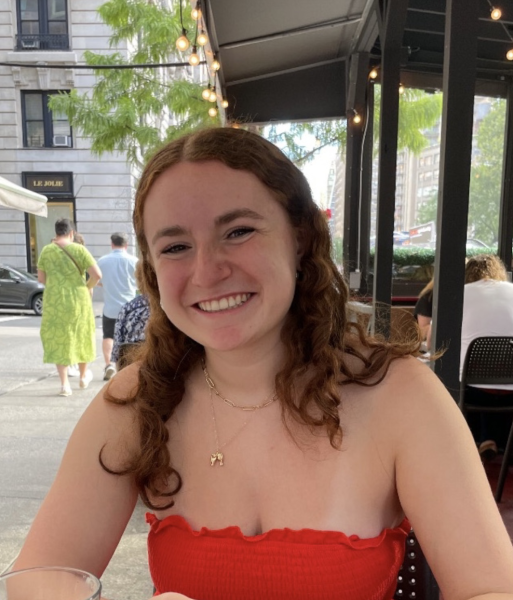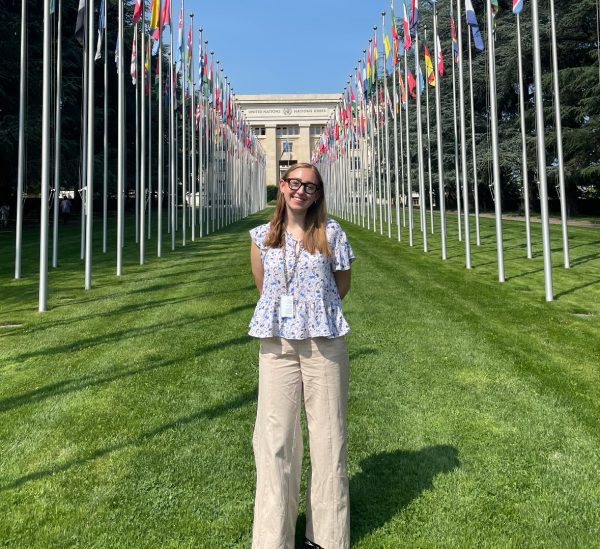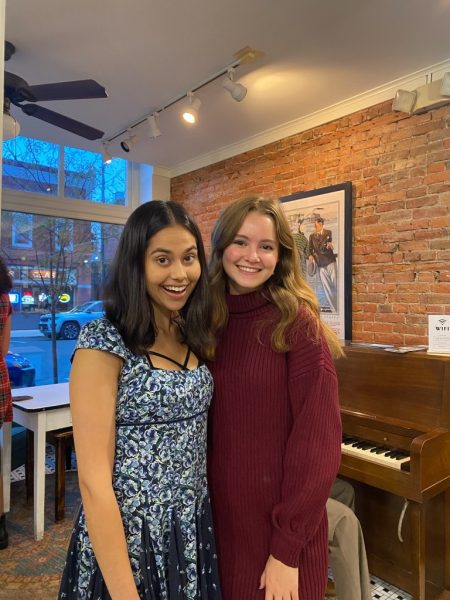Christine King: Finding Home at ALANA
When senior Christine King showed up at Colgate’s Africana, Latin, Asian and Native American (ALANA) Cultural Center’s annual ALANAPalooza event in fall 2018 — the third day of King’s freshman year — she had no idea she was entering a place that would become so central to her Colgate experience. Graduating this spring with a concentration in Peace and Conflict Studies and a minor in Middle Eastern and Islamic Studies, King looks back on her time at ALANA, where she works as a social justice peer educator and has found space of community and empowerment to make Colgate more understanding and inclusive for people of all identities.
King recalls first becoming interested in social justice advocacy through discussions with her grandfather about his experience immigrating to the United States from the Caribbean. Coming to the U.S. alone to get his master’s degree in Engineering from Columbia University, her grandfather went on to gain employment and work his way into leadership at a contracting company in New York City. Inspired by her grandfather’s success, adaptability and perseverance in the face of discrimination, King hopes to facilitate greater understanding and communication about systems of oppression and marginalization.
“I think my greatest influence looking back would be my grandfather,” she said. “I thought about … the discrimination he faced growing up. When he got to the United States, he was one of the few people working in his job. At Columbia, he was one of the few black students in his classes. And then he got a job, and he was one of the few black men who were able to rise in the ranks in the company.”
King carried her grandfather’s strength into her first year at Colgate as she struggled to adjust to the predominantly white institution. Although she went to a high school that was similarly racially homogenous in Long Island, she was able to travel to New York City to find an outlet to engage with a diverse community. At Colgate, however, she remained constrained to the limits of rural Hamilton, recalling feeling unsure and frustrated, unable to express herself freely among different types of people.
“Freshman year, I grappled a lot with the whiteness of Colgate… Finding my place, and navigating how I wanted to deal with it. Did I want to completely assimilate? You know, adapt, basically, assimilate to the dominant culture of Colgate or kind of, you know, stand out and push against it.”
Intent on finding a platform where she could freely express herself, King began engaging with cultural spaces and organizations on campus, including ALANA and Sisters of the Round Table (SORT) in the spring of her first year — she found a community of people facing challenges similar to her and a place where she felt understood, accepted, and safe. ALANA also provided her with an outlet where she could begin to channel her frustrations with racial issues on campus into action and begin working on changing the outlook of the general Colgate community.
“I spent a lot of freshman year … to myself. It wasn’t until [halfway through] did I start finding a community through cultural places like the ALANA Center. I was looking for places where I could … find more ways to be productive [in] bringing diversity and equity to Colgate, and find places where I accepted myself, so I started going to ALANA events.”
Throughout her next two years at Colgate, ALANA took on a new meaning for King as she began to consider working there. She increasingly desired to actively work to make the university a more inclusive environment. After being appointed as a Diversity, Equity, and Inclusion (DEI) chair for her sorority, Gamma Phi Beta, and leading a mandatory bias training with her fellow DEI chairs, King remembers being frustrated with its inadequacy and obsolescence. Determined to make the most out of the diversity training experience, she teamed up with another DEI chair to rewrite the program and make it meet the needs of Colgate.
“I remember being disappointed by the program because I felt that it was so extremely outdated, and just didn’t really address the specific complexities of the issues that are exclusive to Colgate. That was kind of the beginning of my passion of wanting to continue building curriculums and exploring certain topics for the Colgate community.”
Committed to her goal to make Colgate an inclusive and accepting community for people of all backgrounds, King decided to apply for one of the seven Social Justice Peer Educator positions at ALANA. Through this role, she hoped to continue to spread greater understanding and awareness about issues that people of marginalized identities may face on campus and expand the organization’s involvement to all aspects of campus. While beginning the role, King remembers becoming aware of the scope of ALANA, realizing that it not only advocated against racism, but also issues of but also issues affecting accessibility, learning disabilities, and the LGBTQ+ community on campus. Having to create curriculums and organize events for these issues not only expanded her own understanding of their complexity, but also how to examine herself.
“While being mentored by upperclassmen, I learned about the nuances of what the Cultural Center deals with. I realized that for so much of my time [at Colgate,] I was looking at my experience on campus through just a racial lens,” she said. “My time at ALANA Cultural Center opened it to much more things like mental health.”
Her role as a Peer Educator also awoken King to the extent of a safe platform ALANA provides for the Colgate community. As she created, led, and attended more of ALANA’s programs, she became aware of how the organization served as a space for people to discuss and learn about issues that would normally not be discussed in a classroom or very public setting. Through her involvement with these events and discussions, she was able to enhance her own understanding of others and skills as a social justice educator.
“I think a lot about the vulnerability of what we do at ALANA. I think one of the most incredible things was the ALANA Center’s ability to allow people to be super vulnerable in those spaces and really speak on things they wouldn’t speak on otherwise,” King said. “It really opened my eyes and made me a better social justice peer.”
One of ALANA’s current goals, according to King, is to expand its outreach and connection with all groups of students on campus. Working with the organization’s current director, Esther Rosbrook, King hopes to help people’s understanding of ALANA’s purpose as a safe space and education for people of all identities — not just those that are marginalized. Through this, King and Rosbrook hope to make ALANA into a platform in which different types of communities can build relationships and greater bonds.
“We brought up the questions [in our meetings], like ‘How can we … facilitate these relationships with different communities on campus that wouldn’t meet otherwise?’”
While she no longer works as a peer educator, King remains active in ALANA, hoping to continue her work in social justice advocacy through a legal career.














